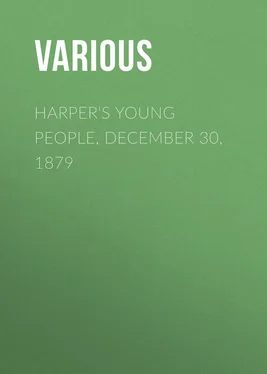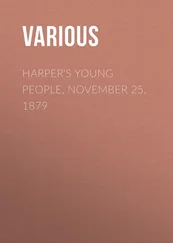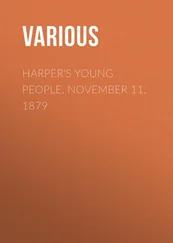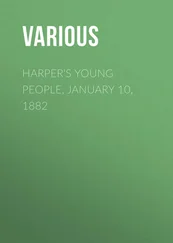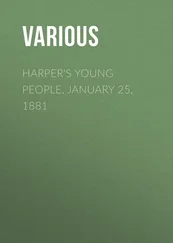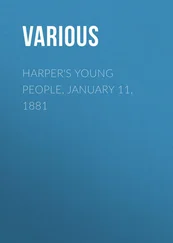Various - Harper's Young People, December 30, 1879
Здесь есть возможность читать онлайн «Various - Harper's Young People, December 30, 1879» — ознакомительный отрывок электронной книги совершенно бесплатно, а после прочтения отрывка купить полную версию. В некоторых случаях можно слушать аудио, скачать через торрент в формате fb2 и присутствует краткое содержание. Издательство: Иностранный паблик, Жанр: foreign_edu, periodic, на английском языке. Описание произведения, (предисловие) а так же отзывы посетителей доступны на портале библиотеки ЛибКат.
- Название:Harper's Young People, December 30, 1879
- Автор:
- Издательство:Иностранный паблик
- Жанр:
- Год:неизвестен
- ISBN:нет данных
- Рейтинг книги:3 / 5. Голосов: 1
-
Избранное:Добавить в избранное
- Отзывы:
-
Ваша оценка:
- 60
- 1
- 2
- 3
- 4
- 5
Harper's Young People, December 30, 1879: краткое содержание, описание и аннотация
Предлагаем к чтению аннотацию, описание, краткое содержание или предисловие (зависит от того, что написал сам автор книги «Harper's Young People, December 30, 1879»). Если вы не нашли необходимую информацию о книге — напишите в комментариях, мы постараемся отыскать её.
Harper's Young People, December 30, 1879 — читать онлайн ознакомительный отрывок
Ниже представлен текст книги, разбитый по страницам. Система сохранения места последней прочитанной страницы, позволяет с удобством читать онлайн бесплатно книгу «Harper's Young People, December 30, 1879», без необходимости каждый раз заново искать на чём Вы остановились. Поставьте закладку, и сможете в любой момент перейти на страницу, на которой закончили чтение.
Интервал:
Закладка:
Various
Harper's Young People, December 30, 1879 / An Illustrated Weekly
A COASTING SONG
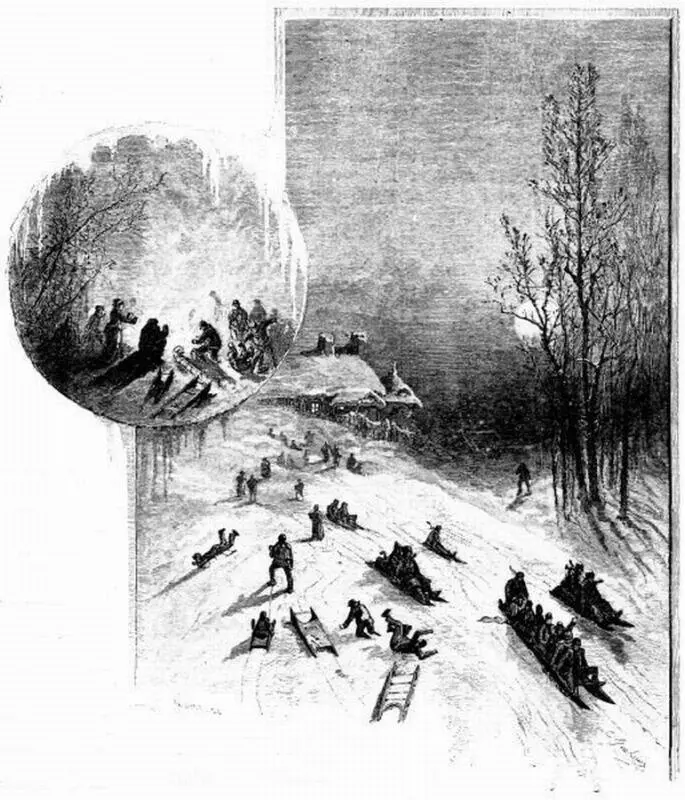
COASTING NEW-YEAR'S EVE.
Drawn by C. Graham.
From the quaint old farm-house, nestling warmly
'Neath its overhanging thatch of snow,
Out into the moonlight troop the children,
Filling all the air with music as they go,
Gliding, sliding,
Down the hill,
Never minding
Cold nor chill,
O'er the silvered
Moon-lit snow,
Swift as arrow
From the bow,
With a rush
Of mad delight
Through the crisp air
Of the night,
Speeding far out
O'er the plain,
Trudging gayly
Up again
To where the firelight's
Ruddy glow
Turns to gold
The silver snow.
Finer sport who can conceive
Than that of coasting New-Year's Eve?
Half the fun lies in the fire
That seems to brighter blaze and higher
Than any other of the year,
As though his dying hour to cheer,
And at the same time greeting give
To him who has a year to live.
'Tis built of logs of oak and pine,
Filled in with branches broken fine;
It roars and crackles merrily;
The children round it dance with glee;
They sing and shout and welcome in
The new year with a joyous din
That rings far out o'er hill and dale,
And warns the watchers in the vale
'Tis time the church bells to employ
To spread the universal joy.
Then the hill is left in silence
As the coasters homeward go,
And the crimson of the fire-light
Fades from off the trodden snow.
So the years glide by as swiftly
As the sleds rush down the hill,
And each new one as it cometh
Bringeth more of good than ill.
THE FAIRY'S TOKEN
Ethelreda, the Fairy of Northland,
Was singing a song to herself,
As she swung from a wreath of soft snow-flakes,
And smiled to another bright elf.
What token shall we send to our darling,
Our name-child, fair Ethel, below
In the house which is down in the valley
All covered and calm in the snow?
Shall we gather our glorious jewels,
And wind them about her lithe form?
They would glitter and glance in the sunshine,
And merrily gleam in the storm.
Shall we clothe her in whitest of ermine,
And robe her as grand as a queen;
Weave her laces of ice and of frost-work,
A mantle of glistening sheen?
She would shudder and cry at the clasping,
She would moan aloud in her woe,
And think the gay robes had been fashioned
By cruelest, bitterest foe.
I will none of these gifts for my darling,
Neither jewels nor laces rare,
Neither diamonds nor pearls of cold anguish—
My gift shall be tender and fair.
Early Ethel awoke Christmas morning,
And found on her pillow that day
A bunch of bright little snow-drops,
From kind Ethelreda, the Fay!
THE BRAVE SWISS BOY
VIII.—THE REWARD OF FIDELITY
Walter met with a friendly reception from General De Bougy—a brave old warrior who had served under Napoleon, and fought at Waterloo, where he had been severely wounded, and had lost his right foot by a cannon-ball. His hair was gray, and his countenance weather-beaten; but in spite of his age and infirmities he enjoyed tolerably good health, and was always in good humor. Having from long experience become a keen observer of those around him, it was not long before he recognized the merits of his new servant, to whom he soon became as much attached as his nephew had been.
Walter had been about three months in the general's service, and it seemed to all appearance as if he was likely to become a permanency there, when a letter arrived from Paris, the reading of which suddenly changed the customary gayety of the old man into the deepest gloom.
"This is a sad affair," said he to Walter, who happened to be in the room at the time. "My poor nephew!"
"Mr. Lafond? What is the matter with him?" inquired Walter, earnestly.
"He is ill, dangerously ill, poor fellow, so the doctor informs me," replied the general. "You can read the letter yourself. He seems to complain of being surrounded by strangers, with no one in the house that he can rely on. If I were not such an old cripple, I would go and help him to the best of my ability; for although he has led a thoughtless, reckless life, a more thorough-hearted gentleman does not live. Poor Adolphe!"
"I must go to him, sir," said Walter, suddenly, after hastily reading the letter, the perusal of which had driven all the color from his cheeks.
"You! Why, it is not long since you left him; and what do you want to go back for?" inquired the general, in surprise.
"Can you not guess, sir? I must go and nurse him. He must at least have one person near him to pay him some attention."
"If you care for him so," exclaimed the general, "why did you leave his service?"
This led Walter to explain to the old gentleman the reasons which had compelled him to give up his situation, and again to beg permission to act the part of nurse to his former master. A tear sparkled in the old man's eye as the youth declared the attachment he had always cherished for Mr. Lafond. "Go to him, then," said he. "I can not trust him to a more faithful attendant; and as soon as I can I will follow you, and take my place with you by his bedside. Poor Adolphe! Had he only possessed firmness of character, and avoided bad company, he might have been well and strong to-day. But his unhappy weakness has brought him to the grave before his time, in spite of all my warnings, and entreaties. As he has sowed, so must he reap. Ah, Walter, his fate is a terrible proof of the consequences of evil habits. But all regrets are useless now. Let us lose no time in giving what little help we can."
Making all the necessary preparations for the journey without a moment's delay, Walter soon reached Paris. When he entered the chamber of Mr. Lafond he was shocked at the change which a few short months had made in his appearance. It was evident that the doctor had rather disguised than exaggerated the danger he was in. The sunken eyes and withered face showed only too plainly that the space of time allotted to him on earth was but short. Walter sank on his knees by the bedside and taking the pale and wasted hand in his, breathed a prayer that God might see fit to deal mercifully with a life yet so young; while the invalid smiled faintly, and stroked the cheek of his faithful attendant.
"Dear Walter, how good of you to come back!" murmured the invalid. "I thought you would not leave me to die alone. I feared that your prediction would prove true, and therefore I did not wish you to go home. I wanted to have a true friend with me at the last moment which I feel can not be far off now."
The faithful Switzer saw that Mr. Lafond too well knew the critical condition he was in to be deceived by any false hopes, and he therefore did everything in his power to make the last days of the dying man as free from pain and discomfort as possible. Who could tell what might be the effect, even at so late a period, of careful nursing and devoted attention? But all his thoughtful and loving care seemed in vain.
"The end is coming," said the invalid one evening, as the glowing rays of the evening sun streamed into his apartment. "I shall never more look upon yonder glorious sun, or hear the gay singing of the birds. I have something to say to you, Walter, before I go. Do you see that black cabinet in the corner? I bequeath it to you, with everything it contains, and hope with all my heart that it will help you on in the world as you deserve. Here is the key of my desk, in which you will find my will, which confirms you in the possession of the cabinet and all its contents. And now give me your hand, dear boy. Let me look once more upon your honest face. May Heaven bless you for all your kindness and devotion! Farewell!"
Читать дальшеИнтервал:
Закладка:
Похожие книги на «Harper's Young People, December 30, 1879»
Представляем Вашему вниманию похожие книги на «Harper's Young People, December 30, 1879» списком для выбора. Мы отобрали схожую по названию и смыслу литературу в надежде предоставить читателям больше вариантов отыскать новые, интересные, ещё непрочитанные произведения.
Обсуждение, отзывы о книге «Harper's Young People, December 30, 1879» и просто собственные мнения читателей. Оставьте ваши комментарии, напишите, что Вы думаете о произведении, его смысле или главных героях. Укажите что конкретно понравилось, а что нет, и почему Вы так считаете.
